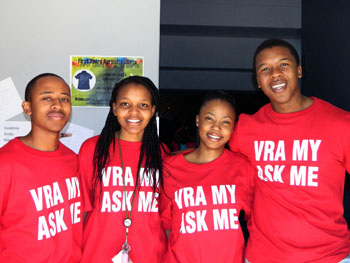
Photo: Stefan Lotter |
This is the first step to a bright future.
This was the resounding message that welcomed first-year students to the South Campus. “Remember,” Tshegofatso Setilo, Manager of the University Preparation Programme said, “a journey of a thousand miles begins with the first step.” But please do not get discouraged on your way, she urged, because “this is your first step to a bright future.
In his welcoming message, Prof Nicky Morgan, Vice-Rector: Operations at the UFS referred to the South Campus as the giant of the south. “This is one of the trailblazing campuses of the university,” he said. “No doubt what you’ll experience on this campus, you’ll never forget.”
This year, the South Campus boasts with 1 200 first-year students taking part in our University Preparation and Extended Programmes. These programmes allow students – whose matric marks did not reach the required total – the opportunity to study at the University of the Free State (UFS). The result? An astounding rise in pass rates. Some of the students on the South Campus outperform their peers studying at the Bloemfontein Campus, Prof Morgan remarked.
“You’ve got it in yourself. You’ve got the potential to unleash yourself on the world,” Prof Morgan said. You do not always realise the value of something that has come your way, he said. So, every moment you get an opportunity, he advised, use it to shape your future.
Addressing the newcomers’ fears, Prof Morgan urged each student to open themselves to the good and new experiences waiting for them. “When you find yourself in a new space, it always begins with you,” he said. Learn to understand how to live in harmony in different spaces.
Prof Morgan placed great emphasis on his closing remark: “At university, the more questions you seek to have answered – they’re worth more than the answers you have.”